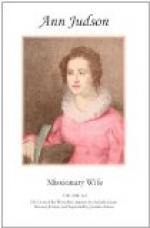On the tenth of April, 1834, Mrs. Boardman was married to one whose character she afterwards declared to be “a complete assemblage of all that woman could wish to love and honor,” the Rev. Dr. Judson With him she removed to her new home in Maulmain, which had undergone wonderful changes since she left it in 1828. Then, the only church there had three native members; now she found there three churches numbering two hundred members! Her duties now were different from what they had been, but not less important; and in a letter written to a very intimate friend one year after her marriage, we find her thus expressing herself: “I can truly say that the mission cause, and missionary labor is increasingly dear to me, every month of my life. I am now united with one whose heavenly spirit and example is deeply calculated to make me more devoted to the cause than I ever have been before. O that I may profit by such precious advantages.”
Many Missionaries had arrived from America and established themselves in different places; several resided at Maulmain; so that Mrs. Judson, as we must now call her, could enjoy much Christian society besides that of the natives. But neither she nor her fellow-laborers had much time to devote exclusively to social intercourse. Beside schools to superintend, and Bible-classes to conduct, and prayer-meetings to attend, societies were to be formed among the half-educated native females in which they could be instructed in maternal and social duties. In addition to these cares, Mrs. Judson took upon herself the task of acquiring a new language, in order to instruct the Peguans, a people who had put themselves under the protection of the British, after revolting against the Burmans. This people were so numerous in Maulmain that the missionaries felt constrained to furnish them with instruction.
Under these labors, Mrs. Judson’s health again failed but after some weeks of suffering, she began to recover, and for many subsequent years her health was uninterrupted. In a letter written some time after, she accounts for her enjoyment of health, in the following manner:—
“When I first came up from Tavoy, I was thin and pale; and though I called myself pretty well, I had no appetite for food, and was scarce able to walk half a mile. Soon after, I was called to endure a long and severe attack of illness, which brought me to the brink of the grave. I was never so low in any former illness, and the doctor who attended me, has since told me, that he had no hope of my recovery; and that when he came to prescribe medicine for me, it was more out of regard to the feelings of my husband, than from any prospect of its affording me relief. I lay confined to my bed, week after week, unable to move, except as Mr. Judson sometimes carried me in his arms from the bed to the couch for a change; and even this once brought on a return of the disease, which very nearly cost me my life. * * I never shall




